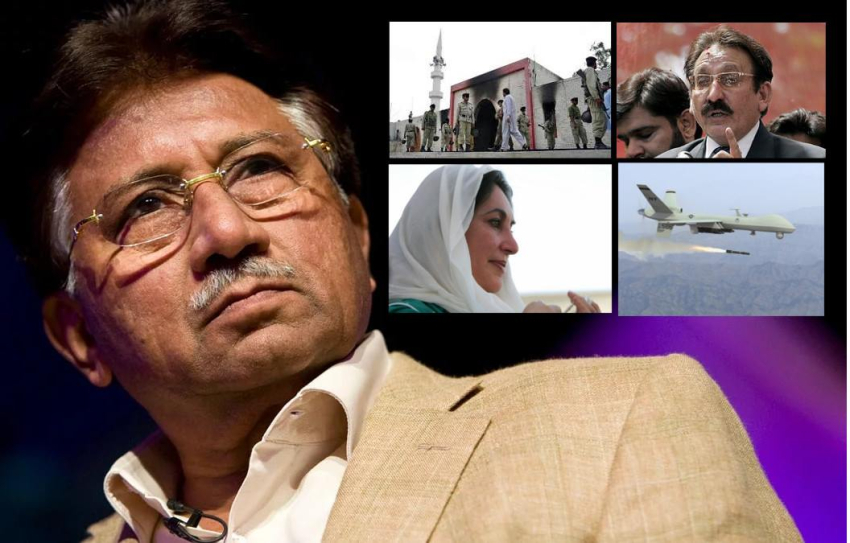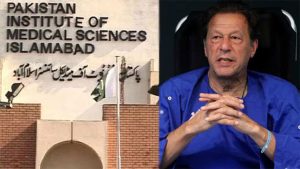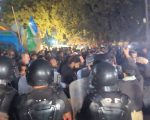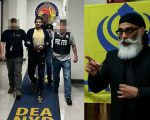The military General Pervez Musharraf, the iron-fisted dictator who arbitrarily ruled over Pakistan from late 1999 to 2008, has survived a recent honey trap. The trap was laid down by country’s Supreme Court to provisionally suspend arrest orders against self-exiled Musharraf being tried on serious charges varying from high treason to kidnapping of judges, terrorism and murder of high profile political leaders.
The top court has been encouraging self-exiled proclaimed offenders to return home without fear of being arrested instantly. However, once they produce themselves before the Supreme Court, the judges have been ordering their arrest to face pending trials. Probably that would have been the fate of General Musharraf, had he returned home. The country’s judiciary has been under intense pressure over what is being perceived ongoing selective justice which means coming down hard on corrupt politicians on comparatively less significant charges while sparing ex-military dictator General Musharraf on far more serious allegations. However, to his great luck at least for the time being, Musharraf did not turn up in the Supreme Court to plead in-person his petition to set aside a 2013’s ruling of Peshawar High Court to ban him for life from holding any public office or contesting general elections. The High Court’s ruling is based on a 14 member judgment of the Supreme Court on July 31, 2009, declaring his November 3, 2007’s martial law as extra-constitutional. He can not hold any office of a political party after rulings of the superior courts against him and that is why the ex-dictator had to resign as head of his political party.
A Fugitive of Law
General Pervez Musharraf has been disobeying orders of the courts for years. He has skipped his appearances in the courts well over a hundred times in a long list of ongoing cases including his involvement in masterminding the murder of former Prime Minister Benazir Bhutto in December 2007, high treason trial for using force to suspend the constitution, imposing second martial law on November 3, 2007 when he feared the judges of the Supreme Court would disqualify him in his capacity as a sitting army chief to contest Presidential elections and killing of hundreds of students at Lal Masjid, Islamabad in July 2007. Like other cases, he is also a proclaimed offender in a case involving the kidnapping of the sitting judges of superior courts in the same year.
His high treason case, an offense punishable either by life imprisonment or death, is the most serious one. He has already been indicted and likely to be convicted. On the orders of the Special Court hearing his trial on treason charges, his citizenship stands revoked for failing to produce himself before the court. In theory, the proceeding to seek his arrest through Interpol, is underway which, however, looks unlikely to happen given Musharraf’s support within the military.
Little known Brazen Legal Facts
The 18th constitutional amendment in April 2010 rendered Musharraf as a dismissed army chief and a usurper. This amendment restored October 12, 1999’s order of the then Prime Minister Nawaz Sharif to sack him because the constitutional cover to his military coupe given in 17th amendment was stripped off in its entirety except retaining the validation of judges who had legalized his coupe. After this amendment, Musharraf, in fact, is no longer legally a former President. Following the 18th amendment, the former President Rafiq Tarar filed a petition with Lahore High Court to restore his status as President till his constitutionally mandated term of January 2002. The petition has yet to be taken up. Musharraf replaced Tarar by ousting him extra-constitutionally on June 20, 2001.
Nonetheless, like Zardari’s government, Nawaz Sharif administration provided him all diplomatic facilities available to a former President through the country’s embassies abroad. Sharif gave in to the military and allowed the dictator to sneak out of the country in 2016, notwithstanding the fact that a high treason case which his government had boldly initiated was active in a trial court against him. Like the People’s Party government, the former Prime Minister Nawaz Sharif could not have withstood pressure from the military to spare its former chief since Sharif has his own skeletons in his cupboard, some of which stand exposed subsequently inform his ongoing trial on money laundering charges.
Other Potential Cases
A Judicial Commission mandated to trace missing citizens early this year admitted that General Musharraf secretly handed over more than 4000 Pakistani citizens to the US from 2002 to 2008. However, the actual figures are believed to be far higher than official estimates. He admitted in his autobiography on how he earned bounties of millions of dollars by selling off people to the US. In some cases, the military regime under Musharraf collaborated with Americans to transport the children of suspected militants to the US where investigators chopped off their hands in an attempt to force suspects to admit their links with terrorism. Many children died in the brutal process of investigations.
In addition to this, many in Pakistan possess solid evidence on how he sold off citizens to the US despite having no links with terrorism, something the US subsequently admitted in some cases. He has left behind a legacy of enforced disappearances, the frequency of which has come down but it is far from over.
The victims’ families have been protesting for more than 16 years about the enforced disappearances. This led to the emergence of Pukhtoon Protection Movement which has attracted thousands of people who have resorted to publicly bashing army and military-run secret services for allegedly detaining their family members.
The National Accountability Bureau is currently investigating how he misused his authority to award luxurious plots and agricultural lands of over one trillion rupees to favorite military officials. That is not all. There are millions of dollars in his overseas banks’ accounts and the luxurious properties he purchased outside Pakistan. He conceded in the English version of his autobiography that he had received millions of dollars as a bounty from the US but when he was asked what happened to that money, the ex-dictator had no answer. And later on, he removed the text on bounties in the Urdu version of his book. It is a matter of time when such evidence is going to become part of the national narrative to hold him accountable to ensure across the board accountability in the country.
Allegations of False Flag Operations
General Musharraf has been under fire for using the bogeyman of fighting terrorism to target his political opponents. He was not only accused to have masterminded the assassination of former Prime Minister Benazir Bhutto by hiring a suicide bomber and a gunman but also in several other cases, lawyers and political figures accused him to have used militants to carry out suicide attacks against them.
At least 17 people were killed and 50 others injured as a suicide bomber blew himself up outside the venue of the district bar council Islamabad on July 17, 2007, where the then deposed Chief Justice Iftikhar Mohammad Chaudhary was minutes away from arriving to address the gathering of lawyers.
Since then, a petition has been pending with Lahore High Court, Rawalpindi bench against General Musharraf for being behind the suicide bombing to target defiant lawyers and Chief Justice who had launched a public campaign for his reinstatement and ouster of the then military dictator.
Not long ago, the former Chief Minister of Punjab Pervez Elahi in an interview disclosed that he prevented a planned attack (masterminded by Musharraf ) on a caravan of lawyers and political activists led by then deposed Chief Justice near his hometown Gujarat in 2007. The then key leader of the lawyers’ movement Aitzaz Ahsan also disclosed that he had received information discreetly on how Musharraf was planning to target him and Justice Chaudhary.
Former Foreign Minister Khawaja Asif blamed Musharraf to have carried out a series of false flag operations in 2013 and 2014. Khawaja said Musharraf himself was behind planting explosive devices on road linking his farmhouse as a justification to avert his appearances in Special Court trying him on high treason charges.
How Musharraf Served US at Pakistan’s expense
General Musharraf gave in to the US pressure to a point where Pakistan’s key geostrategic interests were compromised, the only motive of which was to perpetuate his illegal rule after he overthrew an elected government of Nawaz Sharif in 1999. Lt (retired) General Shahid Aziz ’s autobiography provides an insight into how Musharraf played deceptive games with his own army in an attempt to go out of his way to allow Americans to do whatever they virtually wished under the cover of fighting the war on terror. He allowed Americans to set up espionage network all over Pakistan, the scale of which was revealed by the US intelligence contractor Edward Snowden in 2013. Snowden leaked classified documents which disclosed that the CIA spends more than half of 52.6 billion dollars annual black budget mainly to gather intelligence on how the army and military-run secret service ISI have been hiding anti-US militants and nuclear warheads in Pakistan. It is not the end of his saga.
Through his intelligence network, Musharraf encouraged clerics in Lal Masjid to take on the writ of the State in order to create public panic through media. Subsequently, the former dictator used it as a justification to launch a military operation and kill hundreds of students despite the fact that the negotiations were successful and clerics were ready to vacate the Madrassah. However, the military under his command opted to burn all innocent students to death by using phosphorus. Later on, weapons were smuggled into the Madrassah to make it look like a battleground as if there was a face to face gun-battle there. In fact, through this operation, he once again projected himself as the one who was fighting American war on terror at a time when the movement of lawyers was gaining ground to oust him from power. In nutshell, his blunder gave militants a cause to fight for and tens of thousands of Pakistani citizens and security personnel were killed in retaliation to military operation inside Lal Masjid.
His bargaining chip with Americans was at a humiliating level and more person-specific, the ramifications of which Pakistan continues to face. Washington does not take Pakistan seriously because of which there has been no letup to American pressure on Islamabad to do more to fight against militants.
The ex-military dictator also made frustrated attempts to recognize Israel diplomatically which failed due to strong public resentment. His former commanding officer and the head of ISI, the late General Hamid Gull in an interview (https://www.dailymotion.com/video/x2pagkl) cited the 2003’s interview of Israeli President Shimon Peres with News Week that he (Peres) prayed every night before going to the bed for General Musharraf. Gull said that Musharraf was surrogated by the US and he is a Jewish baby who worked against Pakistan’s geostrategic interests.
Musharraf always justified his policy of supporting the US by saying that he had secured assurances from Washington to resolve Kashmir dispute and install a friendly government in Kabul, none of which, however, ever materialized as the world does not take seriously leaders who put their petty personal interests over the interests of their nations.
Foreseeable Political Backlash
Justice retired Iftikhar Chaudhary gained popularity within a short span of time after he resisted his illegal removal as Chief Justice of the country in March 2007. This led to a mass movement for rule of law which finally compelled Musharraf to step down in late 2008. Chaudhary, in fact, was not popular but he exploited resentment against Musharraf to his advantage. Now five years down the line to his retirement, the former Chief Justice is politically a dead horse and is as irrelevant to the country’s national politics as is Musharraf. Both only exist in the media and their political parties have no chance of winning from perhaps even a single constituency in forthcoming general elections on 25, July this year.
People largely believe that Nawaz Sharif is corrupt and he has been rightly ousted by the Supreme Court on whose order he is also being tried on money laundering charges. However, Sharif’s narrative of selective justice is gaining ground that the judiciary backed by the military is targeting only politicians while the ex-military dictator is being spared despite facing far more serious charges and prosecutions in the courts. The bitter fact is that blue-eyed Musharraf’s offenses outweigh corruption charges against all other politicians. The ongoing public perception of selective justice, if not balanced with across the board accountability, can potentially turn it into a country-wide political movement after general elections. The movement may not be very different with the one for rule of law in 2007.
Musharraf boasts off in the media on how army played its controversial role to save his skin from the trial on high treason charges which in all likelihood, is likely to see him convicted. It is high time for the army to clear its past burden by not creating any hurdle for the civil administration and judiciary to equally apply the rule of law against its former boss who not only played havoc with geo-strategic interests of the state but also continues to attract public resentment.














